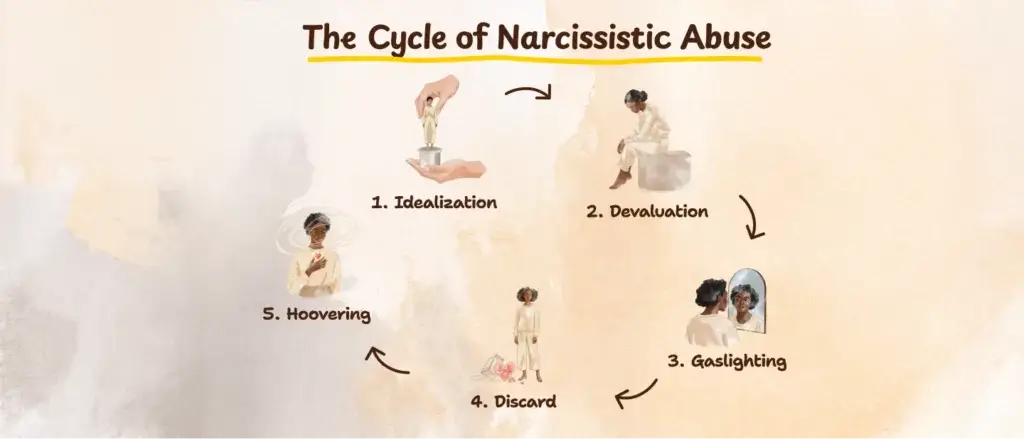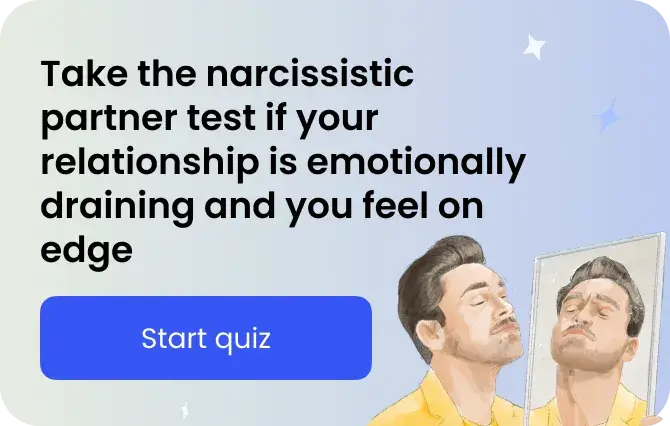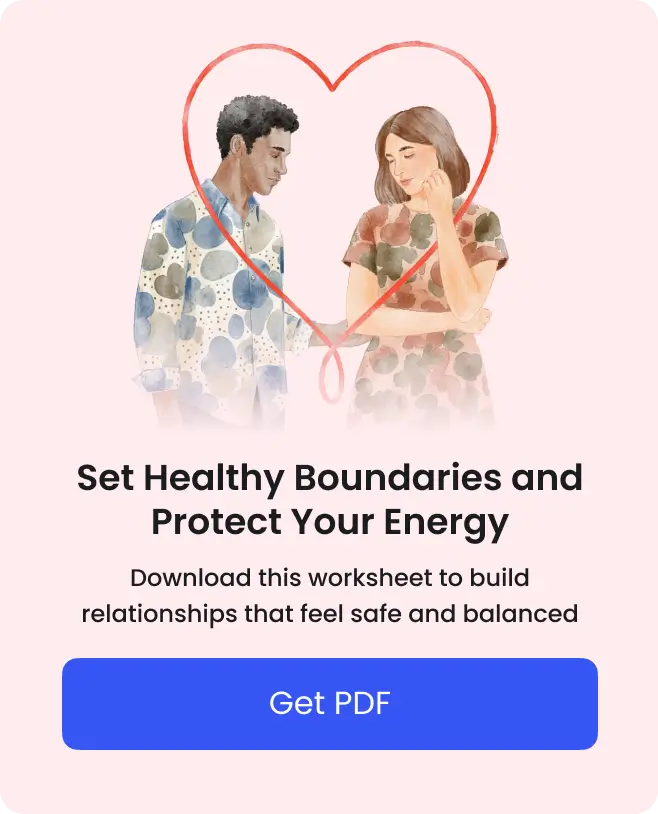When you start dating, you think they’re a perfect partner and a soulmate who seems to understand your every need. However, when they reveal their narcissistic tendencies, this idyllic picture abruptly crumbles, leaving you feeling betrayed and easily manipulated.
The truth is, narcissistic people may target anyone. You might be tempted to believe they were flawless, and you might think that it’s your fault for not appreciating their “devotion.” This is a dangerous illusion.
But here’s the key: it’s not you. Read this article to answer the question, “Why do I always attract narcissists?” and find a way to escape their shadow.
7 reasons why you attract people with narcissistic traits
According to research, among common reasons why you may attract narcissists are childhood trauma and growing up with a narcissistic person, a lack of self-love and boundaries, a high level of empathy, and prioritizing other people’s feelings above your own.
1. Childhood experiences with narcissistic parents
A narcissistic parent might show love or approval only when you do things they like. For example, you might get showered with praise after winning a school competition, but feel completely ignored or even criticized for coming in second. This can make you feel unsure and confused about their feelings.
Lack of unconditional love in childhood and parental emotional neglect or abuse can make you develop a deep-seated need for validation and reassurance. As an adult, you may become attached to distant and cold narcissistic people, as it can feel familiar, even if unhealthy.
2. Attachment style
Insecure attachment styles, formed in early relationships with caregivers, can make you crave the intensity and affection a narcissist offers, even if it’s unpredictable.
For example, having an anxious preoccupied attachment style may lead you to misinterpret a narcissist’s erratic behavior as a sign of passion. This can cause you to become fixated on gaining their approval and love, even when faced with inconsistency and emotional unavailability.
3. It’s difficult for you to prioritize your needs
If you prioritize others’ needs above your own and have weak boundaries, this also might be one of the reasons for the question, “Why do I attract narcissists?”
For people with people-pleasing tendencies, it might be hard to leave unhealthy, toxic relationships. You may feel a sense of responsibility for the narcissist’s happiness or fear. This creates a cycle where you keep giving more and more, hoping to finally earn the narcissist’s approval, which never truly comes.
4. You’re a highly sensitive person
Being a naturally compassionate, sensitive, and empathic person might be the reason why you attract narcissists. As narcissists usually have fragile egos, they might view kindness as a source from which they can draw the admiration and attention they so desperately crave.
Highly empathetic people may justify the narcissist’s behavior or rationalize it to themselves or others. They may believe that giving more of their time, love, and compassion will heal the narcissist and allow them to start a new life.
Narcissists can exploit this warmth, showering the kindhearted person with affection at first, only to slowly chip away at their self-esteem, making them feel broken and left wondering, “Why does nobody like me?”
5. Lack of self-confidence
Low self-esteem can also be the answer to your question, “Why are narcissists attracted to me?” The reason is that many narcissists are drawn to people they can control, research shows. When you struggle with self-doubt or anxiety, you are less likely to identify their manipulation.
6. You’re afraid of relationships
People who fear relationships may subconsciously choose emotionally unavailable men or women with narcissistic traits. This can be the best “defense” against responsibility and commitment, as narcissists can’t guarantee stability, care, and support. If the relationship is unpredictable and chaotic, you never have to deal with the terrifying prospect of a partner who actually sees the real you and expects you to stay.
7. Narcissism
Are narcissists attracted to other narcissists? Yes, because one may have something that attracts the other one—a shaky feeling of self-worth.
People with narcissistic traits can exploit this vulnerability, creating a dynamic where they constantly seek admiration from each other while simultaneously undermining each other’s self-worth.
Imagine, for instance, two high-powered CEOs in a relationship. Each craves public recognition and achievements. They might initially be drawn to each other’s success. Still, instead of genuine support, they might subtly compete for the bigger deal or the flashier car, leaving both feeling insecure and needing external validation.
Stages of a narcissistic relationship

1. The Idealization Phase
This is the “too good to be true” stage. You experience love bombing with constant texting and grand gestures. Moreover, a narcissistic person may fast-forward the relationship and talk about marriage or moving in within weeks. Eventually, you may feel like you’ve finally found your soulmate because they mirror everything you want to hear.
2. The Devaluation Phase
The person who couldn’t stop complimenting you now starts picking at your flaws. It can be subtle at first, like a “joke” about your appearance, a sigh when you talk, or “forgetting” important dates.
This is where gaslighting appears. They do something hurtful, and when you call them on it, they tell you that you’re “too sensitive” or “crazy.”
Expert Insight
Devaluation occurs once the narcissist begins accepting you are a real person with real limitations. Instead of accepting this truth, they perceive such imperfections as devastating flaws. This causes them to start withdrawing from the relationship and projecting anger onto you. It can happen both subtly and intensely.
Nicole Arzt
Mental health professional
3. The Discard Phase
The discard can be cruel and emotionally devastating. It often happens suddenly and without warning, leaving you thinking, “Why do I only attract narcissists?” and feeling abandoned, hurt, or confused.
However, the discard doesn’t always mean a permanent ending. The narcissist may keep you around as an option if the new narcissistic supply doesn’t work out.
4. The Hoovering Phase
Just when you start to heal and move on after ending relationships with a narcissist, they may pop back up with an apology, a fake crisis, or a “thinking of you” text. Unfortunately, they aren’t back because they changed. They just want to make sure that they still have power over you.
6 practical tips to stop attracting narcissists
You can’t change them, but you can change how you approach them and, most importantly, how you see yourself. Here are tips on how to deal with narcissists:
1. Use the “wait and see” strategy
Impose a “Slow Motion” rule. No matter how much “chemistry” you feel, refuse to make major life changes (moving in, joint accounts, constant contact) for at least six months. This way, you can protect yourself from impulsive actions and pressure from a partner with covert narcissism.
If someone promises you a lot today and behaves differently tomorrow, don’t let this affect your life and mental health. When you move slowly, chances are narcissists get bored and look for a “faster” target.
2. Set healthy boundaries
You may start with small “no’s” to see how they react. For example, “Actually, I’m not in the mood for cinema. Let’s have a walk instead.” A green flag in a relationship is a person saying, “Sure, no problem.” However, a narcissist can get annoyed, guilt-trip you, or ignore your request. Their reaction to a small “No” tells you everything you need to know about how they’ll handle a big one.
3. Focus on “consistency” over “intensity”
Start looking for people who are predictable and consistent. Notice whether they call when they say they will. Are they the same person on Tuesday that they were on Saturday? High intensity can be a sign of a narcissistic abuser.
4. Trust your gut feelings
If you want to stop attracting narcissists, notice narcissistic tendencies in people’s behavior, such as a lack of empathy, an excessive need for admiration, and a tendency to manipulate. Learn to trust yourself more than anyone else, and don’t ignore warning signs.
5. Work on your self-esteem
You are unlikely to attract narcissists if you don’t need them for self-worth, research shows. That’s why your goal is to build your “I’m Fine Without You” life. Learn to draw your value from within.
To do this, invest in your self-care, hobbies, and career. Spend time with friends and family. When you have a fulfilling life, you’re less likely to ignore red flags out of a fear of being alone.
You become much pickier because your “baseline” for happiness is already high. The more you understand and rely on yourself, the less other people’s opinions will matter to you, and the less you will need to seek their approval.
6. Increase your self-awareness through therapy
If you are still wondering, “Why do I attract narcissists?” or want to begin the healing process after the narcissistic abuse, you may seek the help of a mental health professional. Therapy may help you become aware of your emotions, desires, and how you want people to treat you in relationships. During consultations, a therapist may conduct in-depth work to explore the causes, attitudes, and early decisions that lead you to attract narcissists and choose them as partners.
4 tips on how to not keep narcissistic people in your life after a breakup
A few weeks or months of silence usually triggers the narcissist to reach out. Here’s how to stop allowing them to stay in your life and make room for healthy relationships:
1. Stop explaining your decision to end relationships
You may try to have a “closure” talk to understand how much they hurt you, but a narcissistic abuser will only use that information to pull you back in. If you’ve already ended it, stop explaining. You don’t owe them a final sit-down. Every word you send is a “hook” they can use to keep the conversation going.
Realize that silence is your strongest message. It says that they no longer have access to your emotions.
2. Block them on everything
A narcissist will use every “back door” to get to you—social media, old email accounts, or even Venmo requests. Don’t just “unfollow.” Block. This includes their friends or family members who might act as “flying monkeys” (people who check in on you just to report back to the narcissist).
3. Expect the “hoover”
Treat their messages like spam mail. Do not “delete” and then dwell on them—just block and move on. If you respond, even to say, “Leave me alone,” you have just told them that it takes exactly X amount of time to break your silence.
Think of the quintessential example: Carrie Bradshaw and Mr. Big. While Big isn’t always labeled a classic narcissist in the clinical sense, their dynamic perfectly illustrates the “Contact Curse.” For years, Carrie stayed in Big’s orbit, treating every phone call or “friendly” dinner as a possibility for change.
How it blocked her growth:
- Carrie couldn’t fully commit to a stable, loving partner because her “friendship” with Big acted as an emotional placeholder. She was physically with Aidan but mentally checking her caller ID for Big.
- By keeping Big around, Carrie remained stuck in the role of the “girl who waits,” preventing her from evolving into a woman who demands consistency.
When you keep a narcissist in your life, you are essentially holding a seat open for them in a theater that should be premiering a whole new show. You can’t meet your “Aidan” if you’re still busy analyzing a text from your “Big.”
4. Build your “emergency exit” squad
Pick two people who know the whole truth. When you feel the urge to check the narcissist’s Instagram or send a “Why did you do this?” text, call your squad instead.
Try to remember that you ended your relationship with them because they were disrespectful, rude, and abusive to you, and you accepted that they could not change for you.
Frequently asked questions
1. How do narcissists 'test' me in the beginning?
They usually use boundary testing. Early on, they might “accidentally” show up late, make a subtle dig at your hobbies, or overstep a small request. If you overlook it or make excuses for them, the narcissist knows the door is open for larger violations later.
2. How can I change my 'vibe' to repel narcissists?
The best way to stop attracting them is to become “low supply.” You can do this by:
- Slowing down. Narcissists love “love-bombing.” If you force a relationship to move at a normal, slow pace, a narcissist will usually get bored.
- Setting small boundaries early. Say “no” to a small suggestion. A healthy person will respect it; a narcissist will become irritated, defensive, or try to guilt-trip you.
3. Will I ever be able to have a normal relationship?
Absolutely. Once you recognize the red flags, such as grandiosity, lack of empathy, and a constant need for praise, you’ll start to see these traits as deal-breakers rather than challenges to overcome. This creates space for partners who offer reciprocity and emotional availability, which are green flags of a healthy relationship.
Sources
- Grapsas S, Brummelman E, Back MD, Denissen JJA. The “Why” and “How” of Narcissism: A Process Model of Narcissistic Status Pursuit. January 2020
- Evita March, Cameron S. Kay, Bojana Dinić, Danielle Leigh Wagstaff. “It’s All in Your Head”: Personality Traits and Gaslighting Tactics in Intimate Relationships. June 2023
- Nevicka B, De Hoogh AHB, Den Hartog DN, Belschak FD. Narcissistic Leaders and Their Victims: Followers Low on Self-Esteem and Low on Core Self-Evaluations Suffer Most. March 2018
Disclaimer
This article is for general informative and self-discovery purposes only. It should not replace expert guidance from professionals.
Any action you take in response to the information in this article, whether directly or indirectly, is solely your responsibility and is done at your own risk. Breeze content team and its mental health experts disclaim any liability, loss, or risk, personal, professional, or otherwise, which may result from the use and/or application of any content.
Always consult your doctor or other certified health practitioner with any medical questions or concerns
Breeze articles exclusively cite trusted sources, such as academic research institutions and medical associations, including research and studies from PubMed, ResearchGate, or similar databases. Examine our subject-matter editors and editorial process to see how we verify facts and maintain the accuracy, reliability, and trustworthiness of our material.
Was this article helpful?






